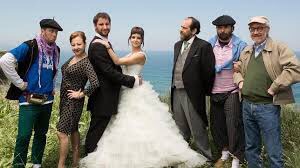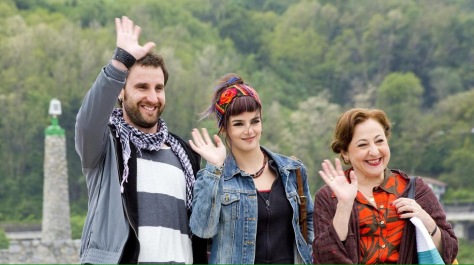
One of my recent projects has been the production of an article on the 2014 box-office smash Ocho apellidos vascos (Figure 1). The article is to be included in a special journal issue on the film. The title of my piece is ‘”marriage itself as theater”: The Performative Politics of Marriage in Ocho apellidos vascos. My contribution focuses on the pivotal role of marriage in the film specifically in terms of its interlocking with performance and performativity. I propose that within the film marriage functions as a form of utopian unificatory politics that works at both personal and political levels.
I completed the article in the summer of 2016 and have recently been asked to make some changes following peer review. As a result, I’ve rewatched and been thinking and reading about the film again. I thought I’d write a post to facilitate some of the ideas I’ve had as a consequence of the extremely thought-provoking questions raised by the reviewers. I’m aware that this a rather messy and untidy piece and what the writing of it has revealed is that I still need to spend some more time mulling over what I think about this film.
In the original version of the article, my argument followed two main strands: the first concerned the performativity of the marriage ceremony and of regional identity in the film while the second linked this to what I termed utopian unificatory politics. By this I mean that the film proposes marriage as a tool for the union of the distinct autonomous regions – specifically Andalusia and the Basque Country – in Spain. One of the reviewers’ suggestions is that I link these two strands more cohesively and consider the extent to which the paradigm of performativity and the utopian unificatory politics are connected in film.

My article details how marriage in Ocho apellidos vascos is a romantic ideal that, while sustained as the primary objective throughout the film, is ultimately unattainable and perhaps even unnecessary. The plot of the film, and indeed that of its sequel Ocho apellidos catalanes, hinge upon the prospective nuptials of protagonist Amaia (Figure 2). We quickly learn that Amaia has been ditched by her Basque fiancé Antxon. Reluctant to reveal the truth to her estranged father Koldo, Amaia persuades sevillano one-night-stand Rafa, whom she meets on her no-longer-required hen do, to pose as Antxon. Though the couple do reach the altar, Rafa is ultimately unable to go through with the marriage. In spite of this, the film concludes (spoiler alert!) with Amaia travelling to Seville to declare her love for Rafa. This ending thus sustains the heteronormative couple, unmarried though reunited, as the desired object.
How does one negotiate this network of ideas surrounding the heteronormative couple then? The film provides an embittered critique of matrimony. Amaia is jilted not once but twice: initially (and outwith the diegetic content of the film), prior to the wedding, by the unseen Antxon and subsequently, at the church altar, by Rafa posing as Antxon. Early on in the film, we witness the protagonist attempting to return her custom-made wedding dress, willing to take a cut-price refund for the item. She later, having been dumped by Rafa, tosses it on the fire in her home, watching the dress disappear into the flickering flames. The wedding dress therefore becomes a symbol of disillusionment with the heteronormative institution of marriage.

Furthermore, there are no examples of happy marriages beyond the central coupling of the film (Figure 3). There is no mention made of Rafa’s parents. Amaia’s parents are separated. She is estranged from her father and has been for six years and her mother, who does not appear in the film, is apparently in a new relationship with a man from Seville. Merche, who poses as Rafa’s mother, is widowed, her Civil Guard husband presumably a casualty of the Basque conflict. The heteronormative institution of marriage, the film appears to suggest, is, if not an unobtainable ideal, then most certainly an outmoded and redundant concept.
With its renunciation of marriage as the ultimate objective of the heterosexual couple, Ocho apellidos vascos conforms to the genre paradigm of the contemporary romantic comedy. While the genre is renowned for its adherence to the narrative pattern that concludes with the happy ending, specifically the union of man and woman (Mortimer 2010: 4), contemporary works have shown a tendency to replace the romantic relationship with friendship (Deleyto 2003: 182). But, like the contemporary romcom, while the film might dismiss marriage as an antiquated idealism, it retains the heteronormative couple as the ultimate objective for its protagonists who are reunited in the concluding sequence, as mentioned above. In this regard then, Ocho apellidos vascos offers no escape from the heteronormative structures and structures that dominate society, politics and culture.
Without wanting to produce a dichotomous or reductive reading, should we interpret this position on marriage positively or negatively? How are we to understand the depiction of the unmarried couple and its function within familial relationships? How might the personal politics, epitomised by the unmarried couple, at the core of this film map onto national politics?

In my original article, I was quite sceptical about the underlying politics of Ocho apellidos vascos. My initial reaction was that the film is proposing the utopian unification of the nation, in which similarities rather than differences are emphasised, by means of a romantic relationship, if not marriage, between two individuals from distinct autonomous regions within Spain. However, having rewatched and thought some more about the film, I’m starting to wonder if the film is amenable to a more nuanced, and perhaps more generous, reading of kinships and affective relations (Figure 4).
The traditional nuclear family, which typically revolves around the mother and father (or, in other words, the heteronormative married couple), is absent in Ocho apellidos vascos. In its place are a series of affiliations forged through choice: Rafa and his friends, who appear to be a substitute for his family; Rafa and his “mother” Merche; even Merche and Amaia’s father Koldo, who will become romantically involved by the end of the film (and whose love will be rekindled in the sequel Ocho apellidos catalanes). With this in mind, to map the politics of the personal onto the national in Ocho apellidos vascos necessitates a nuanced interpretation of the relationship between the family and the nation. What I’m starting to realise, especially in the writing of this post, is that this relationship, and the associated political stance of the film, is more complex than I initially thought. This is not to suggest, of course, that the film is without issues or flaws but rather that I need to unpack in more detail the undercurrents of personal and national politics at its core.

